
Learn more about Salal Investment Services available through CUSO Financial Services, L.P.* and schedule your financial planning check up today.
A presidential election might serve as a period of short-term turbulence, creating discomfort in markets.
One way to combat it? An understanding of market history and the impact of elections on markets, which can serve as Pepto-Bismol for investors.
Peter Mallouk, CEO of Creative Planning, mentioned on a recent episode of Morningstar’s The Long View podcast: “The media has a fiduciary responsibility, but it’s not to you.” Investors should keep this quote dear between now and November.
His point? Media is not incentivized to calm people down or emphasize outcomes that happen over long time horizons—that doesn’t bring eyeballs, which is what sells ads!
“A group of kids went to school today and then returned home safely when the day ended” will never lead the news. It’s not captivating.
But the opposite, something negative? That’s where the engagement often resides.
While oversimplified, this is worth keeping in mind heading into election season. Negativity sells better than positivity. This trend is evident across many forms of media—financial, political, sports, even entertainment.
Movie director Christopher Nolan, famed for Batman and Oppenheimer, once said, “Dystopias sell twice as well as utopias at the box office.”
The next few months could bring that quote to life, as various dystopian visions of the future are painted.
For investors, it’s often understood that the bias should always be towards long-term investing. But a good long-term investor must be able to withstand many turbulent short-term periods that are part of that journey.
Are Democrats or Republicans Better for Stocks?
Looking at 70 years of returns, a Democrat in the White House has been a better outcome for investors.
Since 1953, $1,000 invested when a Democrat is president, sold to cash when a Republican takes office, and then reinvested when a Democrat returns turns into $62,000. The opposite strategy—only investing when a Republican sits in the Oval Office—only grows to $27,000.
Exhibit 1
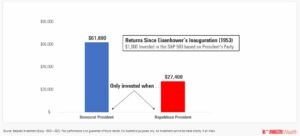
However, this overlooks critical context: investors would have been better off by ignoring Washington D.C. throughout this entire period.
The original $1,000 investment turns into nearly $1.7 million for the investor who never acted on their political preferences and remained invested throughout.
Exhibit 2
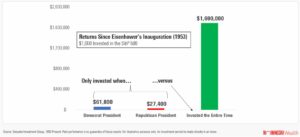
The stock market goes up—and down—under every president, but the path of least resistance has always been higher.
Exhibit 3
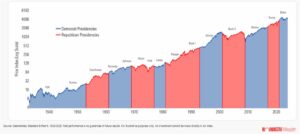
There’s no reason to believe this fact will change regardless of November’s outcome.
In short, politics can be a significant drag on a portfolio. That’s why it’s essential to treat the two like oil and water—items that don’t mix.
Obviously, that’s much easier said than done. And the next few months will be fertile ground for political implications on financial markets.
Politics Mixing with Investing
Major policy differences commonly cited between Trump and Biden are often around topics like healthcare spending, immigration, and business regulation.
One interesting example to draw from might be around the regulatory landscape.
Paramount—one of the most famous brands in media—has been a daily news story for months surrounding the sale of their business, which includes a famous movie studio, the TV channel CBS, and local news stations.
After months of “will they, won’t they,” Paramount recently decided they were no longer for sale.
One theory for abandoning the sale is that the current regulatory environment is too tough. Paramount would likely be dealing with expensive and time-consuming litigation if they pursued a merger.
The current Federal Trade Commission (FTC)—which oversees U.S. business with an eye towards anti monopoly practices and consumer protection—has been aggressive in blocking mergers. For example, the FTC blocked four separate mergers in January alone.
All that to say: the current theory is that Paramount wants to do a sale, but they’re better off waiting until after the election. After the election, a potential leadership change could usher in a friendlier FTC, whose leadership is appointed by the president.
The logic makes sense. But the caveat? Theory is one thing; reality is something else entirely.
We can pull examples from each of the last two presidencies where conventional wisdom indicated one outcome, then something else happened entirely.
Example 1: President Trump and China
After President Trump won in 2016 it was widely assumed his policies would have terrible consequences for companies with exposure to China.
It could be argued no American company does more business with China than Apple. A trade war would inevitably be a negative impact for their business.
A few headlines at the time made this case:

How did Apple’s business perform a year later? Just fine.
Apple’s stock returned nearly eight times the S&P 500 in the year after these articles were written.
Exhibit 4

Source: Morningstar Direct. Past performance no guarantee of future results. An investment cannot be made directly in an index. References to specific securities or other investment options within this piece should not be considered an offer (as defined by the Securities and Exchange Act) to purchase or sell a specific investment. We will not be responsible for any trading decisions, damages or other losses resulting from, or related to, the information, data, analyses or opinions or their use.
To borrow from Rodney Dangerfield in Caddyshack, keep it fair! A similar example exists from the Biden presidency.
Example 2: President Biden and Energy Companies
The Biden administration is often viewed as an enemy to the energy industry. One specific agenda item was to make it harder for energy companies to drill by reducing available permits.
Headlines included:
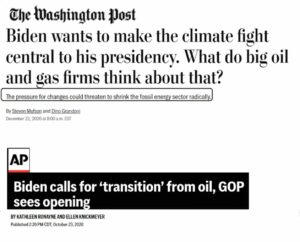
What happened? Like Apple, energy companies did just fine. An index of energy stocks nearly doubled the S&P 500 over the next year.
Exhibit 5
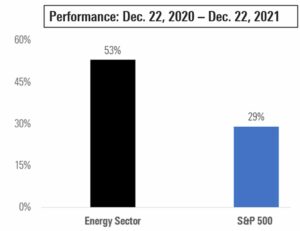
Source: Morningstar Direct. Past performance no guarantee of future results. An investment cannot be made directly in an index.
And if we look back since Biden’s inauguration in January 2021, the best-performing U.S. equity sector has been energy.
Exhibit 6
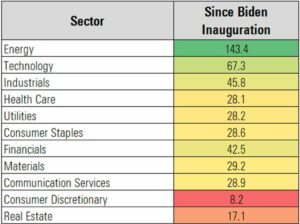
Source: Morningstar Direct. Past performance no guarantee of future results. An investment cannot be made directly in an index.
These are just two recent examples. History is full of more.
But these examples serve as reminders that conventional wisdom can often be wrong, and the influence of politics on the stock market is often less than we might realize.
Resist Reacting to Election Volatility
Money decisions are full of emotions, biases, and blind spots—there’s no need to add another layer of complexity with politics.
It’s been said life is 10% what happens, and 90% is how people choose to react. The next few months will be a measuring stick.
To date, markets have been calm, maybe to calm. The volatility index (VIX) touched its lowest levels in five years last month.
Exhibit 7
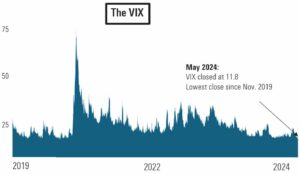
Source: CBOE. January 2019-May 2024.
The election could be a volatility spark, as election years tend to observe more volatility than other years.
Exhibit 8

Source CBOE. 1990-2023.
There’s also the additional factor that the average year tends to observe a stock market decline of 14%. To date, the largest decline has been only 5%.
It’s fair to assume a stock market decline—of some variety—could be on the horizon. But that’s always the case, and not unique to this moment.
If it occurs, media coverage will likely prioritize sensationalism over calming, long-term perspectives, potentially using politics as a convenient angle to fan more flames.
But just remember, their fiduciary duty is not to you.

